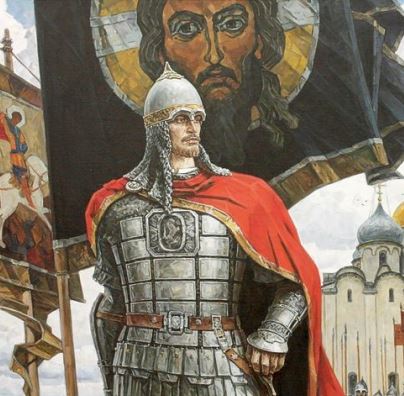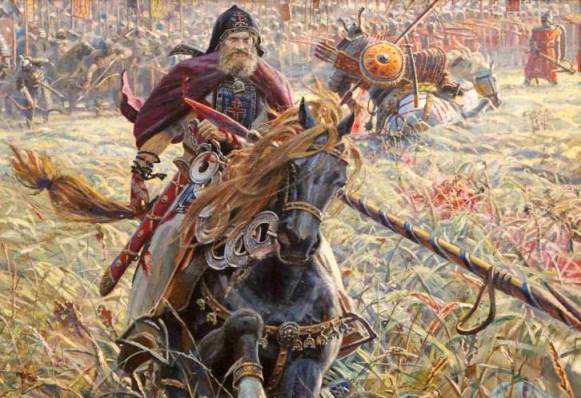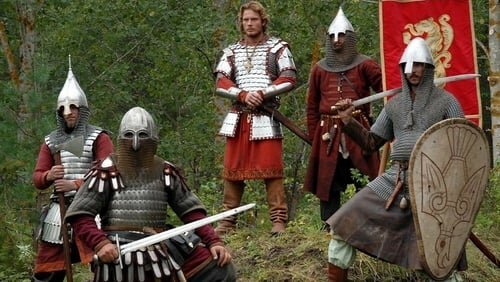Alexander Nevsky
"Whoever will come to us with a sword, from a sword will perish."
It's been a while, hasn't it? I feel like it's been a while.
At some point last week my website was nuked so hard that my hosting provider basically just zipped my entire site up and sent it to me as an email attachment along with a note that reads like one of those letters they sent parents after their kids got blown up on D-Day. As you know, I've been really slacker about updating this page over the last two years or so, but there was just something about looking at my entire life's work assembled in a WinRAR file that made me feel really… inspired. We've done some cool shit on here, haven't we? Let's do more.
So, I went old school. I have no talent in design, so I just modeled the site off the old version that I made back when I was updating this page in Notepad using HTML that I'd taught myself in 1994, and, fuck it. It's going to take some time to get the archives re-uploaded, and I'll put ads on here eventually, but whatever. Just be a bit patient with me and we'll get there.
In the meantime, let's commemorate the impetus for my return to web content by talking about the National Hero of Russia, a hardcore Medieval asskicker who started the trend of people getting fucked up while trying to invade the Motherland and was so badass that he not only has a Military Medal and a Chivalric Order named after him, but who was also Sainted by the Orthodox Church and who also has an 80s Soviet Hair Metal Song written in his honor:
St. Alexander Nevsky, the Viking-descended warrior who fathered the Tsars of Russia and whose last name is literally just taken from the name of a battle where he shanked the Jarl of Sweden in the face with a fucking spear.
Alexander Yaroslavich was born in 1220 in a city called Vladimir. He was born into the House of Rurik, which, as you may recall (the link isn't live yet, get used to that for the next couple of weeks while I re-upload like 600+ website articles) was a badass Swedish Viking who landed in Kiev around 900 AD and was just like, "Yeah, I'm in charge here now," and then eventually started a line of warriors who went on to be the Tsars of Russia for something like five hundred years. Alex's grandfather was a guy named Vselvolod the Big Nest, which is a name I was totally going to make a bunch of dick and/or balls jokes about, but apparently he's called "Big Nest" because he had 14 kids so it seems that Medieval Russian chroniclers already beat me to the punch by about eight centuries.
Russia was a real different place back in the early 13th-century, though possibly not in many of the ways you might imagine. Instead of being a big powerful Empire, Kievan Rus was a loose confederation of a bunch of mostly-independent city-states that mostly just shared a common language and a common undying hatred of German and Mongolian people. Alex's dad was the Prince of Vladimir, which is a really confusing term, because "Prince" back in these days was more like what we'd call a county Sherriff or something today. It was an elected position, voted on by the nobility of the city, and if the nobles decided they didn't like you anymore they could vote to have you removed. The Prince had no economic power, either, and was solely responsible for the military defense of the city. And, well, unfortunately for Alexander’s pops, that defense suddenly became imminently necessary in 1238 when a rampaging army of the Mongol Golden Horde stampeded into town to murder everyone's balls.
Alexander got his first taste of combat during this battle – and getting thrown into action against the Mongols at age 18 was a pretty hardcore introduction to the wonderful world of battlefield homicide. Alex fought heroically in the brief but exceedingly-blood engagement, hacking and slashing against overwhelming numbers and doing everything he could to stem a relentless assault from the single most destructive military force ever assembled in human history. And even though the Russians lost and the city of Vladimir was plundered and torched to the ground, Alexander's bravery and fighting prowess earned him the respect of the Russian people – so much so that later that same year he was voted in to be the Prince of Novgorod, a powerful and very wealthy city not too far from Vladimir. He took the job, moved to Novgorod, and married the Princess of Polotsk… because, hey, you'll probably never have a better opportunity to meet a real-life princess than right after a bunch of rich Russian dudes vote you in as the new Prince of their city.
Well, the Mongols moved on, and for the next year or two things went as well as anything can be expected to go well in Medieval Russia, but in 1240 the people of Novgorod received some pretty grim news – a new Challenger Appeared, and this time from a formidable enemy that the Russians have traditionally hated far more than they ever hated the Mongols: The Catholics.
The letter that arrived in Novgorod was from Jarl Birger of Sweden – the son-in-law of the King of Sweden, and the man who is traditionally credited with being the guy who founded the city of Stockholm. He had landed a large army to the East of Novgorod, within striking distance of the city, and his letter was Medieval nut-flexing at its best. It simply read:
Fight against me, if you dare. I already stand on your land.
Alexander Yaroslavich, Prince of Novgorod, simply picked up his sword, put on his helmet, and strode out the front door of the palace. He wasn't even going to bother trying to call the banners or raise an army – he just summoned his personal bodyguards and put out a decree throughout the city of Novgorod – it simply said grab your weapons and follow me. We’re gonna fuck some shit up.
You know how there's that over-used joke about how invading Russia in the Winter is like the military equivalent of stress-testing a garbage disposal with your forearm? Well, Alexander Nevsky invented that. In fact, as I alluded to in the intro, Nevsky wasn't even this dude's birth name. It's an honorific, like how Scipio Africanus is called that because he kicked ass in Africa. And Alexander Nevsky is called Nevsky because of what he did to Jarl Birger at the Battle of Neva.
The Swedes were camped at the mouth of the Neva River, near the edge of the Baltic Sea (Jarl Birger’s primary goal was to cut off Russia’s access to the Baltic), and Nevsky approached undetected through the nearby forest with a huge angry horde of pitchfork-and-torch Novgorod villagers eager to fuck up some foreign invaders. There happened to be a super dense fog that morning, which Nevksy used to his advantage, maneuvering in close and then catching the Swedes completely off-guard. Birger had not expected Nevksy to act as quickly as he did, and raise such large military numbers on such short notice, and he hadn't had any warning that the Russians were approaching.
In terms of military strategy, that is, like, not a great combination of factors.
The Russian infantry attacked first, and then Alexander Nevsky personally led the flanking cavalry charge that smashed into the Swedish lines and rampaged through their camp. His bodyguards, the Druzhina (an amazing Russian word that literally means "fellowship" but is derived from the ancient Slavic words for "drug" and "friend") hit Jarl Birger's headquarters while he was still in his tent, and in the ensuing melee it's said that Nevsky personally dueled with Jarl Birger and slashed him across the face with a lance. Old Chronicles aren't exactly the greatest source of authentic historical details, but that's fucking awesome. And, no matter which version of the story you read, they all end the same way – with Alexander Nevsky standing triumphantly amid a heap of dead enemies bleeding out in the snow.
"Like lightning he rushed with the brave Novgorod and Ladoga people to the Swedes. The suddenness and speed of the strike instantly confused them. Like a whirlwind, the young prince swept in front of all the enemies in the middle of them and faced his terrible enemy."
Nevsky immediately became a hero across Russia. This must have scared the rich assholes of Novgorod, however, because less than a year later they voted Nevsky out of office as Prince and replaced him with some other jabroni that they had a lot more control over.
They regretted that decision immediately, because like six months after that Novgorod received word that a huge army of fucking heavily-armored German Teutonic Knights were riding into Russia, and that they'd already captured the Russian city of Pskov (just a few days' ride from Novgorod) and were currently in the process of looting, murdering, mayhem, and all that other good stuff that medieval armies are famous for.
As you'd imagine, the rich assholes of Novgorod immediately put up the Bat-Signal and begged Nevsky to come take his old job back.
The Teutonic Knights were on a mission from Pope Gregory IX to "Christianize the Balkans", which was 13th century Pope Code for "just go into Lithuania and murder everyone", and these guys weren't going to stop until they'd turned every Pagan and Russian Orthodox true-believer into either a Papist or a Hamburger.
Alexander Nevsky was there to make sure they'd gotten the memo about motherfuckers attacking Russia in the Winter.
The Teutonic Knights were led by the Prince-Bishop Herman of Dorpat, a German knight who had been rampaging through Estonia and Lithuania, carving a catechism into every Pagan he could wrap his blade around. When Nevsky found the Prince-Bishop and his white-clad knight, their army was arranged out across a frozen lake, which was covered with a thick sheet of ice. Nevsky's previous victory against the Swedes had also been on a sheet of ice, and his armor was a hell of a lot lighter than the stuff the Germans were wearing, so Nevsky was more than happy to draw these fools out into a big epic battle with the fate of Russian civilization hanging in the balance.
The battle that ensued was very famously depicted in the amazing 1938 film Alexander Nevsky, and the already epic battle scene is even more impressive when you consider that it was filmed in the desert in the middle of the summer, and Director Sergei Eisenstein had to use blue spray paint and melted glass to make the ice and snow look real. As a weird side note, Sergei Eisenstein was also the guy who invented the film montage, so every time you see a badass pump-up montage of dudes training or gearing up for a big battle or learning to dance you can thank Sergei Eisenstein for it. Oh, and also, George Lucas sited Eisenstein's depiction of the Battle on the Ice as a major inspiration for the Battle of Hoth in The Empire Strikes Back. I guess in this analogy that makes Alexander Nevsky Luke (Lyuk?) Skywalker.
The Great Northern Crusade began a few years earlier when the Grand Master of the Teutonic Order, Herman von Salza, entered Hungary to battle the Cumans. This detail that has nothing to do with this story at all but bears mentioning only because I like that the Lord Commander of Salsa went to Hungry for Cumin.
On a giant sheet of ice, in the dead of the Russian Winter, Alexander Nevsky personally led an epic charge of his Druzhinas against the full might of Germanic Teuton Crusaders, slamming into them and engaging in an epic battle that raged back and forth for hours. Both sides fought ferociously, but the difficult footing on the ice and the freezing cold soon took its toll on the Germans, and, before long, the tides turned towards the Russian defenders. There are some accounts of the ice cracking open under the weight of the heavily-armored Crusaders, dumping dozens of warriors to their deaths among the freezing-cold waters, but those stories don’t start showing up until a couple hundred years after the battle, so they might not be true. Either way, it looked cool in the movie.
Finally, after a brutal battle, the German attack broke, and the Prince-Bishop ordered his knights to retreat. The battle was won, and the Teutonic Order withdrew back across the Narva River. The river remains the border between Russia and the rest of Europe, even today, 800 years after the battle.
Fun fact, one of the Prince-Bishop’s great-great descendants, Sophie Buxhoeveden, was actually a handmaiden to the Romanov family during the 1910s. Sophie escaped the Russian Revolution with a bunch of Russian Imperial crown jewels hidden in her clothing, and when that one lady came out in the 1920s saying she was the real Tsarina Anastasia, Sophie went to meet her and was like “nope, she’s too short.” Anyway, pretty much everyone in Russia hates her.
Nevsky returned to Novgorod, but things in Russia were changing. The Mongols, having swept through the land, began asserting their dominance over Russia, and they appointed Alexander Nevsky to be the ruler of the city, giving him way more power than he’d ever has as just the Prince. Nevsky went along with this, ruling over the city for the next decade or so, doing what he could to try and maintain order and establish peaceful relations between the Russians and the Mongols… a practice that, in a few instances, actually even required Nevsky to side with the Mongols against Russian nobles who were trying to rebel against them. It's interesting to note, though, that the Russian people today don't give Nevsky a hard time about this – they believe that he was being more forward-thinking, and his experience dealing with (and fighting) the Mongols had taught him that the smart move was not to piss off the Great Khan. Which, honestly, seems legit. And, to his credit, there are many instances of him negotiating with the Great Khan and intervening on behalf of his people – he was able to get the Russians exempt from having to send troops to the Mongol Army, he earned Mongol protection for the Russian Orthodox Church that allowed the church to build many more basilicas and structures across the land, and on more than one occasion he convinced the Khan not to lay down reprisals and start murdering Russians for disobeying him. He was so highly-regarded for these actions that right before the Russians fought and finally defeated the Mongols at the Battle of Kulikovo a hundred years later, they dug up Alexander Nevsky's bones and used them in the ceremony that blessed the army before battle.
Alexander Nevsky died in 1263, during one of those missions to negotiate with the Khan. His grandson Daniel would found the House of Moscow, and his direct descendants would become the first Tsars of Russia (Ivan the Terrible was Nevsky’s 7x-great grandson). For his services to the Russian Orthodox Church, Nevsky was Sainted, and in 1725 Catherine the Great created the Imperial Order of Alexander Nevsky and made it one of the top honors in the Russian Empire (when World War II broke out Stalin re-instated it as one of the highest military medals you could receive in the Red Army). The 1938 movie about his life (filmed at a time when the Russians were a little bit anxious about the idea of more Germans coming across the Narva River) is one of the most famous films in the history of Russian Cinema, and in 2008 a TV poll named him the Greatest Russian Ever. Nowadays his remains are laid to rest in the Monastery of Saint Alexander, built atop the site where he won the Battle of Neva, and the mausoleum is also the final resting place of national heroes like Dostoevsky, Tchaikovsky, and Mussorgski.
Links:
https://russianlife.com/stories/online/alexander-nevsky/
https://www.prlib.ru/en/news/685590
https://www.britannica.com/biography/Saint-Alexander-Nevsky
http://www.historyworld.net/wrldhis/PlainTextHistories.asp?historyid=205
http://www.allempires.com/article/index.php?q=battle_neva
Sources:
Bressler, Richard. The Thirteenth Century: A World History. Jefferson, NC: McFarland & Company, 2018.
Carleton, Gregory. Russia: The Story of War. Cambridge: Harvard University Press, 2017.
The Chronicle of Novgorod 1016-1471. Trans. Robert Mitchell and Nevill Forbes. Hattiesburg, MS: Academic International, 1970.








